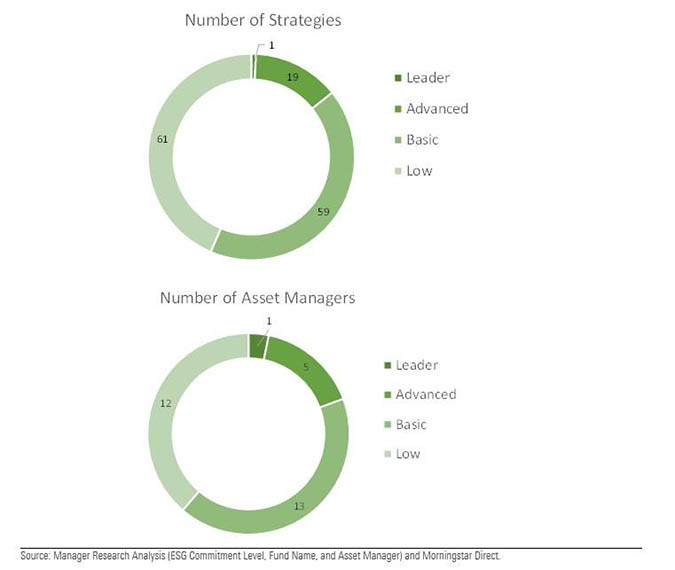
This month, Morningstar expanded coverage of its ESG Commitment Level assessments, to include an additional 251 funds and 30 asset managers, globally. This year, a total of 16 funds available for sale in Hong Kong, Singapore or Taiwan are included in the latest Morningstar ESG Commitment Level report.
What is the Morningstar ESG Commitment Level?
The Morningstar ESG Commitment Level is a qualitative measure of the extent to which asset managers and funds incorporate ESG considerations into their investment processes. It aims to help investors better understand how environmental, social, and governance factors inform investment strategies, and also which funds and asset managers are committed to delivering the ESG outcomes that best meet their preferences.
The ESG Commitment Level assessments are assigned by Morningstar research analysts and come in addition to quantitative ESG tools such as the Morningstar Sustainability Rating and the Morningstar Low Carbon Designation, which measure the ESG risks in a portfolio.
So far, the ESG Commitment Level only applies to a subset of funds under Morningstar analyst coverage. Last November, we unveiled the results of our first set of evaluations. Last week, we unveiled the results of our second set of evaluations, which consists of 251 funds, representing 140 strategies, and 31 asset managers.
The Leader Board
Commitment level assessments for asset managers consider three “key pillars,” including resources, philosophy and process, and active ownership. The scale runs from best to worst as follows: Leader, Advanced, Basic, and Low. Here’s how the ratings break down broadly among different firms.
Leader
ESG is core to their identity. They have long histories committed to ESG investing, and ESG considerations are ingrained and pervasive in their investment processes, strategies, voting records, and in their own operations. This time around, we awarded our top accolade of Leader to only one firm, Australia's Affirmative Investment Management.
Advanced
Asset managers carrying an Advanced rating are among the industry’s strongest ESG proponents and are deliberate in integrating ESG considerations into their investment processes using robust resources and formal monitoring. However, there are areas of their combined portfolios to which ESG investing principles are not deliberately applied, unlike asset managers assigned to the Leader level. Five European asset managers earned an Advanced Morningstar ESG Commitment Level: Amundi, BNP Paribas, HSBC, Jupiter, and LGIM.
Basic
Many of these firms are still in the early stages of their ESG incorporation journey, while others are much further along, although not far enough to be classified as Advanced. Some have a well-intentioned approach and dedicated resources, but their proxy-voting records and disclosures may still be works in progress. This is the largest group of fund managers and includes Allianz Global Investors, Invesco, JPMorgan, State Street, and T. Rowe Price.
Low
Firms at this level are typically just getting started on incorporating ESG considerations into their processes, using ESG criteria in a limited or more-variable way, or simply not incorporating ESG at all. Twelve earned an ESG Commitment Level of Low, including Franklin Templeton, Janus Henderson, Mellon Investments, and VanEck land in this group.
Summary of the second round of Morningstar ESG Commitment Level assessments

ESG Commitment Level for Strategies
At the fund level, out of the 140 strategies assessed this time around, only 20 received our top accolades of Leader and Advanced. This is mainly because our second cohort contains a majority of funds that do not focus on ESG. Out of the 140 strategies, 98 are conventional strategies that may incorporate ESG considerations but do not seek to achieve a specific ESG outcome and for which ESG is not a determining factor. Only one was awarded an ESG Commitment Level of Leader, Affirmative Global Bond Fund domiciled in Australia.
Leader funds integrate ESG factors fully into their security analysis and portfolio construction, and they deliver desirable ESG outcomes at the portfolio level, such as a high sustainability profile, advancing the UN Sustainable Development Goals, or similar. To achieve this outcome, these funds' investment teams are armed with a large amount of data sources, and analysis is carried out by a well-size team with strong expertise in ESG topics. Finally, Leader strategies incorporate purposeful proxy voting and corporate engagement to push companies toward more sustainable practices, and they typically have best-in-class procedures for reporting and disclosure.
Advanced
We have awarded a Morningstar ESG Commitment Level of Advanced to 19 strategies. This group includes actively managed funds such as Fidelity Sustainable Asia Equity, in addition to exchange-traded funds including the US-listed UBS (Lux) FS MSCI EM SRI. For these funds, ESG considerations are a key part of the strategy even if they fall short of ESG Leader funds in one or more areas. ESG data affects security selection and portfolio weights and may drive portfolio-level targets to meet certain sustainable metrics. To deliver such outcomes, Advanced strategies have investment teams that exhibit strong ESG credentials.
Basic
Fifty-nine strategies have received a Morningstar ESG Commitment Level of Basic. This group encompasses the broadest range of ESG practices, from simple exclusionary screens, such as integrated approaches like those seen in Schroder International Selection Fund US Small & Mid-Cap Equity and US Smaller Companies. These funds may not explicitly pursue any ESG outcomes, but they demonstrate some degree of ESG incorporation and have the resources and expertise to implement it.
Low
We have assigned a Morningstar ESG Commitment Level of Low to 61 strategies, including Capital Group New World, and Loomis Sayles Multisector Income Fund. This group is the largest of the 140 strategies in our second cohort, a natural outcome given the cohort is heavily populated with nonintentional ESG strategies. For these funds, ESG considerations play only a minor role, if any, in the execution of the strategy. Some are just beginning to incorporate ESG research into their processes.
©2021 Morningstar. All rights reserved. The information, data, analyses and opinions presented herein do not constitute investment advice; are provided as of the date written, solely for informational purposes; and subject to change at any time without notice. This content is not an offer to buy or sell any particular security and is not warranted to be correct, complete or accurate. Past performance is not a guarantee of future results. The Morningstar name and logo are registered marks of Morningstar, Inc. This article includes proprietary materials of Morningstar; reproduction, transcription or other use, by any means, in whole or in part, without prior, written consent of Morningstar is prohibited. This article is intended for general circulation, and does not take into account the specific investment objectives, financial situation or particular needs of any particular person. Investors should consult a financial adviser regarding the suitability of any investment product, taking into account their specific investment objectives, financial situation or particular needs, before making any investment decisions. Morningstar Investment Management Asia Limited is licensed and regulated by the Hong Kong Securities and Futures Commission to provide investment research and investment advisory services to professional investors only. Morningstar Investment Adviser Singapore Pte. Limited is licensed by the Monetary Authority of Singapore to provide financial advisory services in Singapore. Either Morningstar Investment Management Asia Limited or Morningstar Investment Adviser Singapore Pte. Limited will be the entity responsible for the creation and distribution of the research services described in this article.












.png)








